| Srl | Item |
| 1 |
ID:
166882
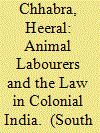

|
|
|
|
|
| Summary/Abstract |
This article is a tentative effort to highlight the symbiotic but systematically underrated position of animals in labour history. It argues for an expansion of human-centric definitions of labour to include non-human animals in this domain. The discussion focuses in later parts on colonial rule in India to examine debates about three colonial legislative enactments dealing with animals as labouring bodies in various capacities. Predictably, this colonial discourse and intervention remains human-centric, too. Yet, closer reading of such historical evidence also indicates exciting scope for developing various aspects of the ‘animal question’ in relation to labour history and South Asian studies.
|
|
|
|
|
|
|
|
|
|
|
|
|
|
|
|
| 2 |
ID:
095301
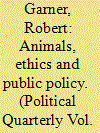

|
|
|
|
|
| Publication |
2010.
|
| Summary/Abstract |
In orthodox moral thinking in the West, animals count for something but human interests take precedence. It is argued that this moral orthodoxy or animal welfare position is flawed. It fails to take into account that some animals, like humans, are persons and that some, so-called 'marginal' humans lack personhood. More importantly, although it is likely that animals do not have an interest in liberty for its own sake and have less of an interest in continued life than humans, there is little justification for the animal welfare claim that an animal's suffering should be regarded as less important morally than that of a human. It is concluded that the adoption of a 'sentiency position', whereby animals have a right not to suffer, has radical implications for the way animals are treated, ruling out intensive forms of animal agriculture and those scientific procedures that inflict suffering as morally illegitimate.
|
|
|
|
|
|
|
|
|
|
|
|
|
|
|
|
| 3 |
ID:
193467
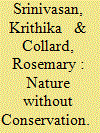

|
|
|
|
|
| Summary/Abstract |
The predominant approach of protecting or restoring floral and faunal life after harming, displacing, or destroying them in service of human interests does not hold much promise for nature on Earth in the age of the Anthropocene. Such approaches fail to address the ethical and political-economic cores of what tend to be presented as techno-scientific or ecological problems. If the planet is to remain home to life beyond the human, mainstream human societies need to rethink their place, role, and entitlements on Earth, and relearn to cohabit with human and nonhuman others, even in the face of risk and uncertainty.
|
|
|
|
|
|
|
|
|
|
|
|
|
|
|
|
| 4 |
ID:
114017
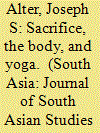

|
|
|
|
|
| Publication |
2012.
|
| Summary/Abstract |
In most general terms, hathayoga involves the internalisation and embodied literalisation of the Vedic fire sacrifice. Reflecting on the place of sacrifice in anthropological theory, and on the way in which sacrifice structures the relationship between humans and gods in terms of gift obligations, this paper explores the theoretical implications of hathayoga's embodied literalisation of a profoundly symbolic act. Although similar to various forms of ascetic renunciation, hathayoga is unique, it will be argued, in being structured as the physiological antithesis of religious ritual. Self-realisation based on the internalised yajna sacrifice undermines the binary structure of the sacred and the profane and makes god irrelevant. This raises theoretical questions concerning the social significance of a ritual that is anti-social on a number of different levels.
|
|
|
|
|
|
|
|
|
|
|
|
|
|
|
|
| 5 |
ID:
161945
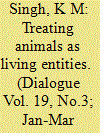

|
|
|